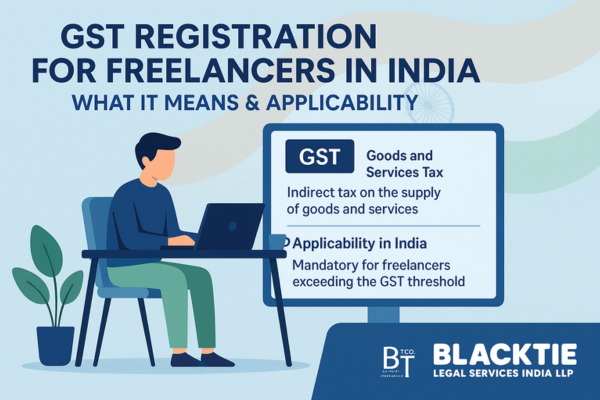
For Applying GST Registration Click Here…
What is GST Registration for Freelancers?
Freelancing has become a popular career choice in India, with professionals offering services like content writing, web design, graphic design, digital marketing, software development, and more. But along with opportunities comes the responsibility of paying taxes. GST registration in India for freelancers is a legal requirement under the Goods and Services Tax (GST) law for individuals earning beyond a certain limit from their freelance work.
Simply put, GST registration ensures that freelancers comply with tax regulations, collect GST from clients (if applicable), and file returns in the same manner as businesses do.
📌 Meaning of GST for Freelancers
For freelancers, GST (Goods and Services Tax) means a consumption-based tax that applies to the services they provide. When a freelancer is registered under GST, they are required to:
Charge GST on invoices issued to clients
Collect the tax and deposit it with the government
File GST returns regularly
In short, GST for freelancers means treating freelance services like any other taxable business. So if you’re a freelancer providing services to Indian or international clients, GST registration ensures your work stays tax-compliant.
📌 Applicability in India
GST registration is not mandatory for every freelancer in India—it depends on income and the nature of services. The key rules are:
Threshold Limit: Freelancers must register for GST if their annual turnover exceeds ₹20 lakhs (₹10 lakhs in special category states).
Interstate Services: If a freelancer provides services to clients in another state, GST registration becomes mandatory even if the turnover is below the threshold.
Export of Services: Freelancers offering services to international clients are also covered under GST. Exports are considered “zero-rated supplies,” meaning GST is not charged, but registration is still required to claim benefits.
👉 In short, GST registration for freelancers in India applies when income crosses the specified limit or when interstate/overseas services are provided.
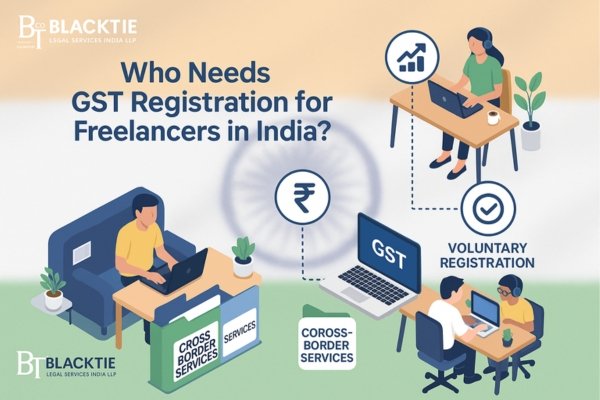
Who Needs GST Registration as a Freelancer in India?
Not every freelancer in India is required to register under GST. The need for GST registration for freelancers depends on income, the type of services, and where the clients are located. Below are the key scenarios:
✅ Annual Turnover Limit for GST Registration in India
A freelancer must register for GST if their annual turnover exceeds ₹20 lakhs (₹10 lakhs in special category states such as those in the North-East). This threshold applies to income earned from all freelance services combined. For example, if a freelance content writer earns more than ₹20 lakhs in a financial year, GST registration becomes mandatory.
✅ Freelancers Providing Services Outside India
If a freelancer provides services to clients outside India, it falls under the category of “export of services.” These services are considered zero-rated supplies, meaning GST is not charged on the invoice. However, freelancers still need GST registration to avail the benefits such as claiming input tax credit or refunds. In short, international projects also require attention to GST registration for freelancers.
✅ Voluntary GST Registration in India
Even if a freelancer’s income is below the threshold, they can opt for voluntary GST registration. This is beneficial because:
It enhances credibility when working with corporate clients.
It allows freelancers to claim input tax credit on business expenses.
It prevents issues if they expand their business in the future.
Many freelancers choose voluntary registration to appear more professional and compliant, especially when dealing with companies that prefer GST-registered vendors.

Documents Required for Freelancer GST Registration in India
To complete freelancer GST registration in India, certain documents are mandatory. These ensure the government verifies the identity, address, and business details of the freelancer. Here’s the list of key documents required:
✅ PAN Card and Aadhaar Card
The PAN card (Permanent Account Number) of the freelancer is compulsory for tax identification. Along with it, the Aadhaar card is required for identity verification and linking with the GST portal.
✅ Bank Account Proof
Freelancers must provide proof of their bank account used for receiving payments. This can be a cancelled cheque, bank statement, or passbook copy showing the account details in the freelancer’s name.
✅ Business Address Proof
Even if you are working from home, you still need to provide proof of your business address. Accepted documents include:
Rent agreement/utility bill (if rented property)
Ownership document (if self-owned property)
NOC from the owner, if applicable
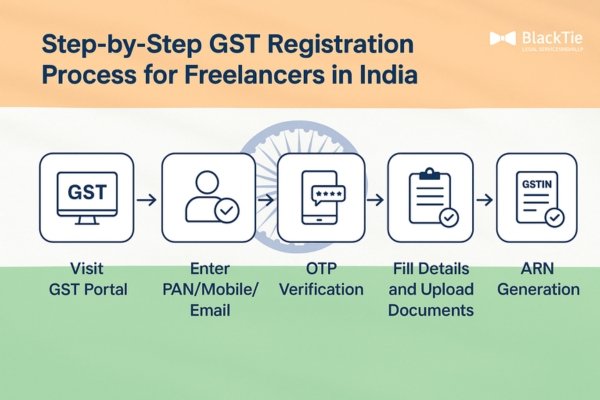
Step-by-Step Process of GST Registration for Freelancers in India
Registering for GST might look complicated at first, but the process is completely online and user-friendly. Here’s a simple step-by-step guide to help freelancers get their GST registration in India:
✅ Step 1: Visit the GST Portal
Go to the official GST portal
. This is where you will start the process of GST registration in India for freelancers.
✅ Step 2: Fill Part A of the Form
Enter your PAN card details, mobile number, and email ID in Part A of the registration form. These details are essential for identity verification.
✅ Step 3: Verification through OTP
An OTP (One-Time Password) will be sent to your registered mobile and email. Enter the OTPs to complete the verification process.
✅ Step 4: Fill Part B and Upload Documents
In Part B, provide all the required details like business name, address, bank account, and upload supporting documents such as PAN, Aadhaar, bank proof, and business address proof.
✅ Step 5: ARN Generation and Application Tracking
Once you submit the form, an Application Reference Number (ARN) will be generated. You can use this ARN to track the status of your application on the GST portal.
✅ Step 6: GSTIN Allotment
After verification by the GST authorities, you will receive your GSTIN (Goods and Services Tax Identification Number). Once allotted, you are officially registered under GST and can start issuing GST invoices.
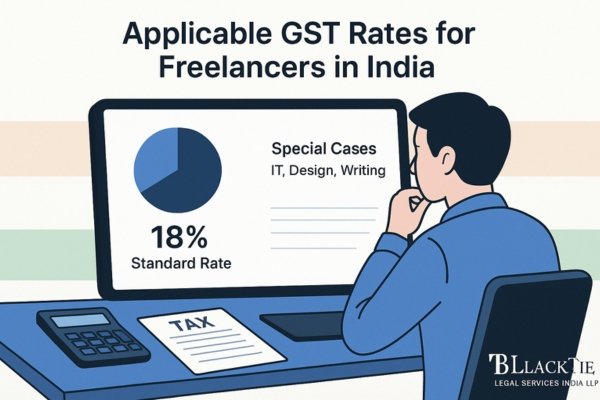
GST Rates Applicable to Freelancers in India
Understanding the GST rates for freelancers in India is important to charge clients correctly and stay compliant with tax rules. Unlike goods, most freelance services fall under a standard GST rate of 18%. However, in certain cases, the applicability may vary based on the type of service offered.
✅ GST Rates for Services (Generally 18%)
Most freelance services, such as consulting, content writing, graphic design, IT services, marketing, tutoring, and digital marketing, are taxed at 18% GST. Freelancers must add this rate to their invoices and collect it from clients.
✅ Special Cases (IT, Design, Content Writing, etc.)
IT & Software Development – 18% GST
Digital Marketing, SEO, Web Design – 18% GST
Content Writing, Copywriting, Translation – 18% GST
Graphic Designing, Video Editing, Photography – 18% GST
Training, Online Tutoring, Consultancy – 18% GST
In short, almost all professional freelance services are covered under the 18% slab, unless specifically exempted by GST notifications.
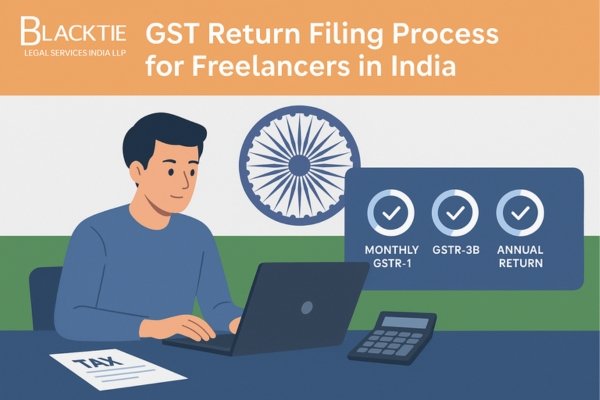
GST Return Filing for Freelancers
Once you complete GST registration, it is equally important to comply with GST return filing for freelancers. Filing returns ensures that the tax collected from clients is properly reported and paid to the government. Here’s how it works:
✅ Monthly/Quarterly Returns (GSTR-1 & GSTR-3B)
GSTR-1: This return shows the details of all outward supplies (invoices issued to clients). Freelancers must report the services provided and the GST charged.
GSTR-3B: This is a self-declaration return where freelancers pay the GST collected after adjusting for input tax credit (if applicable).
👉 Depending on turnover, freelancers can file returns either monthly or under the QRMP scheme (Quarterly Return, Monthly Payment).
✅ Annual Return Requirements
Freelancers also need to file an annual return (GSTR-9) if their turnover exceeds the prescribed limit (currently ₹2 crore for businesses). This return summarises all GST-related activities for the entire financial year.
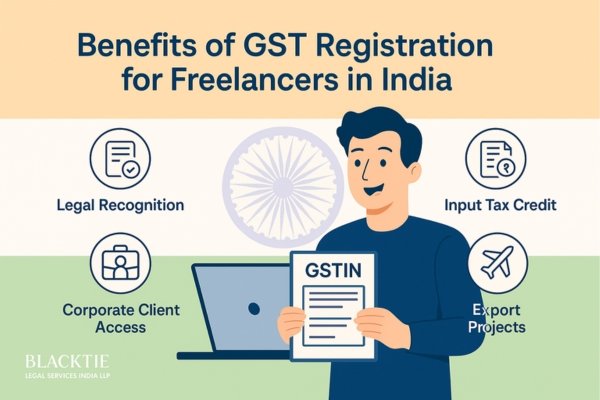
Benefits of GST Registration for Freelancers
Getting GST registration is not just about tax compliance—it also offers several advantages that can help freelancers grow their business. Here are the key benefits of GST registration for freelancers in India:
✅ Legal Recognition as a Business
Once registered, freelancers are legally recognised as a business entity under GST law. This adds credibility and helps build trust with clients, especially in competitive markets.
✅ Input Tax Credit Claim
Freelancers who pay GST on expenses like software subscriptions, internet bills, or office supplies can claim input tax credit (ITC). This reduces overall tax liability and lowers business costs.
✅ Easier to Work with Corporate Clients
Most companies prefer working with GST-registered service providers in India because it simplifies their own compliance. With GST registration, freelancers can issue tax invoices, making it easier to secure high-value corporate projects.
✅ Export Benefits for International Projects
Freelancers offering services to clients outside India can classify them as export of services. Under GST, exports are zero-rated, meaning freelancers can claim refunds on input taxes paid, boosting profitability on international projects.
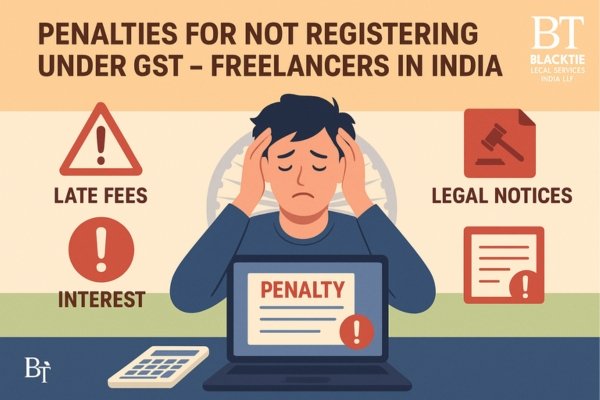
Penalties for Not Registering Under GST
Freelancers in India who are liable to register under GST but fail to do so can face strict penalties and legal consequences. The government has laid down clear rules to ensure tax compliance. Here are the main penalties you should know:
✅ Late Fee and Interest
If a freelancer delays GST registration or return filing, they must pay a late fee along with interest on the unpaid tax amount.
The interest rate is 18% per annum, calculated from the due date until the payment is cleared.
✅ Legal Consequences
Operating without a mandatory GST registration is considered a violation of the GST law.
The penalties can include:
10% of the tax due or ₹10,000 (whichever is higher) in case of genuine mistakes.
100% of the tax due if the failure to register is proven to be a deliberate attempt at tax evasion.
In extreme cases, repeated non-compliance may lead to prosecution or stricter legal action by the tax authorities.
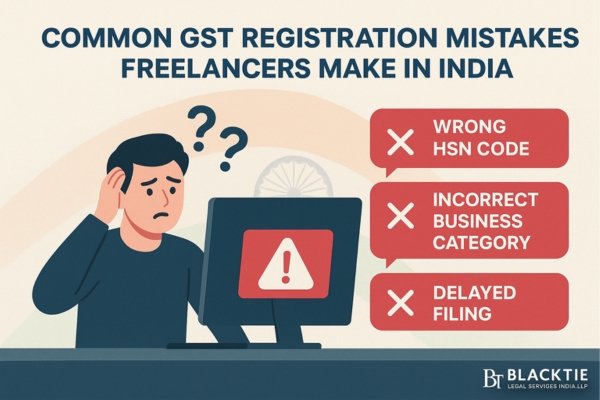
Common Mistakes Freelancers Make in GST Registration in India
While applying for GST registration in India for freelancers, many make small but costly mistakes that can lead to delays, penalties, or even rejection of the application. Here are some of the most common errors to avoid:
✅ Wrong Business Category
Freelancers often select the wrong business category when filling out the GST application. Choosing an incorrect category may affect compliance and lead to mismatches in future GST filings.
✅ Incorrect HSN/SAC Codes
Every service under GST has a specific SAC (Service Accounting Code). Freelancers sometimes enter the wrong code, which can cause confusion during GST return filing and lead to notices from authorities.
✅ Delay in Filing Returns
Many freelancers complete GST registration in India but fail to file GSTR-1 and GSTR-3B returns on time. Delayed filing attracts late fees, interest charges, and penalties, even if there is no income in a particular period.
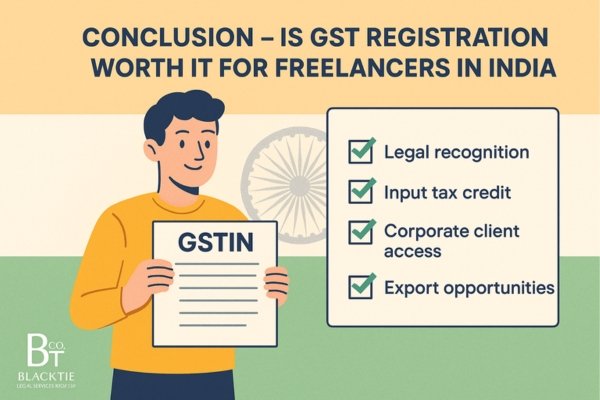
Conclusion – Is GST Registration Worth It for Freelancers?
For freelancers in India, GST registration may seem like an extra burden at first, but in reality, it is an essential step toward professionalism and growth. By registering under GST, freelancers not only stay legally compliant but also gain recognition as a legitimate business. It opens doors to bigger opportunities, especially with corporate and international clients who prefer working with GST-registered service providers.
The benefits of GST registration in India for freelancers—such as input tax credit, easier invoicing, and export incentives—far outweigh the compliance responsibilities. On the other hand, failing to register when required can lead to penalties, interest charges, and legal troubles.
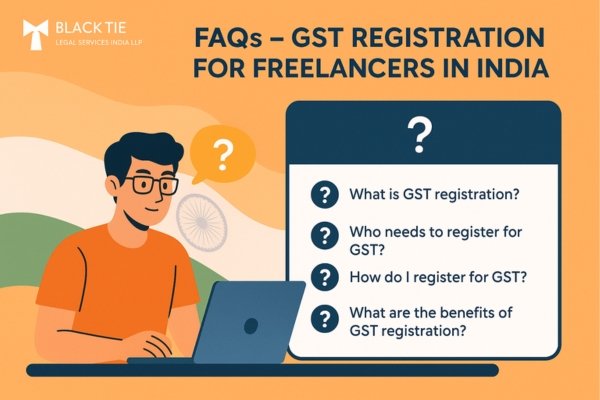
FAQs
Is GST registration mandatory for freelancers in India?
Yes, GST registration is mandatory if a freelancer’s annual turnover exceeds ₹20 lakh (₹10 lakh in special category states). It is also required if they provide services to clients outside India.
What is the GST rate applicable to freelancers?
Most services offered by freelancers—like IT, digital marketing, content writing, and design—fall under the 18% GST rate.
Can freelancers voluntarily register for GST even if not mandatory?
Yes. Many freelancers opt for voluntary GST registration in India to get input tax credit and to work with corporate clients who prefer GST-compliant invoices.
What documents are required for freelancer GST registration in India?
The key documents include PAN card, Aadhaar card, bank account proof, and business address proof. In some cases, additional documents like a rent agreement or NOC may be required.
How can freelancers file GST returns?
Freelancers must file GSTR-1 (sales details) and GSTR-3B (monthly/quarterly tax payment). If turnover exceeds the prescribed limit, they also need to file an annual return (GSTR-9).
What happens if a freelancer doesn’t register under GST?
Failure to register can result in penalties, late fees, and legal consequences, including a minimum penalty of ₹10,000 or 10% of tax due, whichever is higher.
